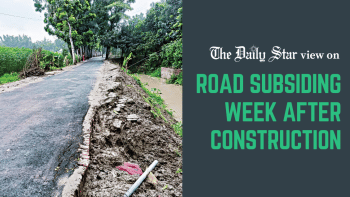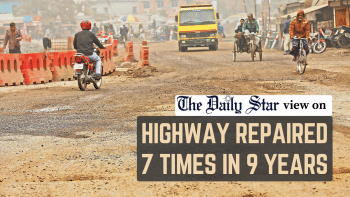Timely road repairs are vitally needed

It is disheartening to learn of the dire condition of rural roads in many parts of Bangladesh. According to data cited by a Prothom Alo report, about 50 percent of the roads under the Local Government Engineering Department (LGED)—which has the most extensive road network in the country with approximately 3.73 lakh kilometres of roads connecting upazilas, unions and villages—require immediate repair. And about 25 percent of those, mostly unpaved village roads, are said to have been rendered unusable. As per another estimate published in October, 60 percent of all paved roads in rural areas have become dilapidated, posing risks to commuters and hindering daily activities.
Last week, at least two MPs of the recently formed parliament raised concerns about the woeful state of roads in their constituencies, bringing critical focus to this issue. The importance of regular road repair/maintenance in a tropical region like ours cannot be overestimated. For LGED, its ever-expanding network is itself a challenge, of course. But there are practical issues that require consideration. For one, the allocated annual budget is often insufficient to meet the extensive repair needs. Add to that the excessive vehicular load, flooding and rainfall, and lack of roadside drainage which make roads vulnerable to damage or deterioration. These issues frequently overlap, with the unmet need for timely (and minor) repairs leaving roads in a bad shape, thus necessitating major repairs, and causing further strain on the budget.
But one issue that is not highlighted enough is the role of politically influential contractors. The answer to the question of "how to prolong the lifespan of roads and minimise the need for costly repairs" lies in ensuring the quality of road construction, repairs or upgrades. Unfortunately, often this hasn't been possible because of the substandard materials used by those contractors. This is a problem not just for the LGED. Over the years, the allegations of shoddy construction have been raised in case of many road, highway, bridge and culvert projects. Often, political identity is considered while awarding contracts, and those who secure contracts this way hardly feel the need to ensure quality, and rarely are they held accountable afterwards. Often, their collusion with corrupt officers also shoots up the budget for projects.
So, while addressing other problems associated with repairs, the authorities must break this corrupt cycle, and make quality control and regular inspection a vital part of all road-related projects, otherwise we will not be able to ensure their durability. The LGED, for now, must expedite the process of dealing with its huge backlog of repairs. Rural communities in many areas are suffering because of poor, pothole-ridden roads. It's affecting them in many ways every day. They deserve a solution sooner than later.


 For all latest news, follow The Daily Star's Google News channel.
For all latest news, follow The Daily Star's Google News channel. 










Comments